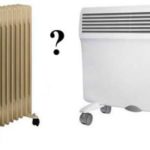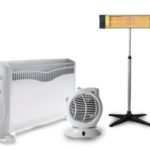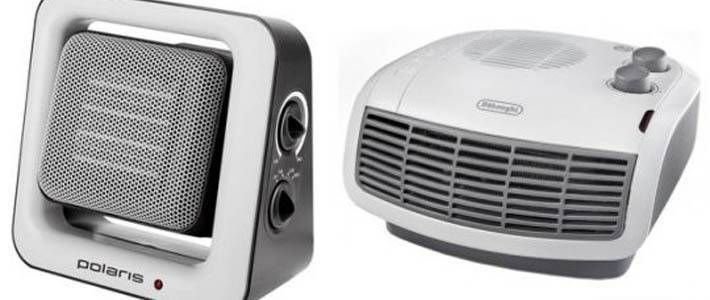Which is better, a fan heater or an oil heater?
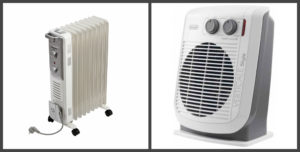 With the onset of cold weather, additional devices are often required to heat utility rooms or rooms where there is not enough heat from the centralized heating line. The most convenient portable heaters are an oil radiator and a fan heater. Let's look at each of them in more detail to decide which one is more economical, and get acquainted with the other advantages of both devices.
With the onset of cold weather, additional devices are often required to heat utility rooms or rooms where there is not enough heat from the centralized heating line. The most convenient portable heaters are an oil radiator and a fan heater. Let's look at each of them in more detail to decide which one is more economical, and get acquainted with the other advantages of both devices.
The content of the article
What is a fan heater
As the name suggests, this device is similar in design to a classic fan, only it is designed not for cooling, but for heating. It has a heating element and blades that drive heated air into the room.
Principle of operation
Based on the type of heating element, there are:
- Spiral. Heating is carried out using a metal wire through which an electric current passes. These are the most inexpensive fans, but they also last
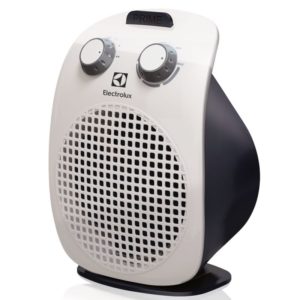 services limited.
services limited. - Ceramic. Special ceramic plates are heated in them. The heat transfer and durability of such models is much higher than that of spiral models.
- Based on tens.A heating element is a special metal tube filled with a highly thermally conductive substance in which a heating element is located. For greater heat transfer, heating elements are equipped with special fins, but for fans, smooth tubes are more often used so as not to impede the air flow.
Advantages and disadvantages
The main advantage of fan heaters is the uniform distribution of warm air in the room. The propeller sucks in cold air from the floor and blows out warm air. As a result, the entire area warms up faster; there are no warm or cold areas.
The advantages also include the low weight and compactness of the devices. This allows you to install them anywhere where additional heating is required: in the corridor, closet, etc.
Fan heaters have many disadvantages:
- Of course, noise comes first. The fans are not at all quiet; not only does the propeller constantly spin, but the heating on/off relay also clicks. There is absolutely no place for a fan heater in the bedroom, especially if the person is a light sleeper.
- The security of the device is also not great. Only expensive models are equipped with spatial position sensors. Budget fans are lightweight and can easily be dropped, causing a fire.
- Fan heaters dry the air, which is already dry in winter.
- Fans waste a lot of electricity due to the constant rotation of the blades.
- When dust gets inside the device, it begins to burn, emitting an unpleasant odor.
IMPORTANT! The air flow from the fan heater raises dust from the floor, which can cause allergic reactions. The room where the device is located requires daily wet cleaning.
What is an oil heater
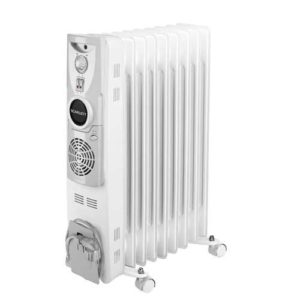 Along with fan heaters, electric radiators are used for heating. Their body consists of metal that can heat up quickly and transfer heat effectively. Inside there are heating elements immersed in oil, hence the name - oil heater. Cheap Chinese models use iron for the body with special anti-corrosion treatment inside and outside. More expensive models use aluminum and its alloys.
Along with fan heaters, electric radiators are used for heating. Their body consists of metal that can heat up quickly and transfer heat effectively. Inside there are heating elements immersed in oil, hence the name - oil heater. Cheap Chinese models use iron for the body with special anti-corrosion treatment inside and outside. More expensive models use aluminum and its alloys.
Principle of operation
When the device is connected to the electrical network, the oil in the radiator begins to heat up under the influence of the heating elements. The heating rate depends on the power of the device and the number of heating elements in it. The temperature is controlled by the user using buttons or toggle switches on the heater body.
After reaching the set parameters, heating stops, the heating elements are turned on only to maintain the temperature.
Advantages and disadvantages
An oil cooler has many advantages:
- The device operates almost silently, only occasionally clicking, turning the heating on and off. Minor oil gurgles may be heard.
- The radiator saves energy. After reaching the set mode, it turns off the heating elements and only turns them on for a few minutes to maintain the temperature.
- All models are equipped with sensors for protection against overheating and position in space. The oil heater switches off automatically when tipped over.
IMPORTANT! Cheap models with a thin metal casing can leak over time, and this is an extremely fire hazard.
Not without its drawbacks:
- The oil in the housing takes a long time to warm up, it all depends on the volume and power of the heating elements. Therefore, the room will not be warm immediately; you will have to wait.
- There is no air circulation in the devices, so the room does not warm up evenly. It's hot near the radiator, but the other corners are much cooler.
- The heater of any model is quite heavy. You can move it around the rooms only with the help of wheels.
IMPORTANT! Free space must be left on the top and sides of the device. It cannot be hung on the wall, tucked under a table or into niches, or covered with things.
Which is better, a fan heater or an oil heater?
As you can see, each of the devices has its own advantages and disadvantages. Accordingly, the choice will be determined by the user himself. Let's consider the main criteria that will help you buy the right device:
- Noise level. When viewed strictly, both devices are not completely silent. If a person is a light sleeper and is able to wake up from any rustle, then the sound of both the fan heater and the oil heater working will disturb him. If you sleep soundly, then none of them will interfere.
- Electricity consumption. For thrifty people, a heater is better suited, because it consumes little electricity once it reaches the set temperature. The fan spins continuously, turning off only the heating elements.
- Compactness. In terms of mobility, fan heaters have no equal. Lightweight and compact, they can fit anywhere. Many models are specially equipped with handles for comfortable transportation.
- Safety. Oil radiators equipped with overheat protection sensors and a built-in spatial position detector are safer. They are insured against falls and fire.
- Price. The most budget-friendly option for additional heating is fans.You can find models from 500 to 1000 rubles, while heaters cost at least one and a half to two thousand.
- Scope of application. It is better to use radiators in bedrooms and living areas; they are quieter and do not dry out the air as much.
IMPORTANT! For rooms prone to freezing of walls or condensation, a fan will be a real godsend. The device not only heats the space, but also dries surfaces with air flow.
The choice of device for additional heating of corridors bordering the street, corner rooms in high-rise buildings with poor thermal insulation of walls is obvious - these are high-power fan heaters. For those who are not affected by this problem, oil heaters are better suited.

